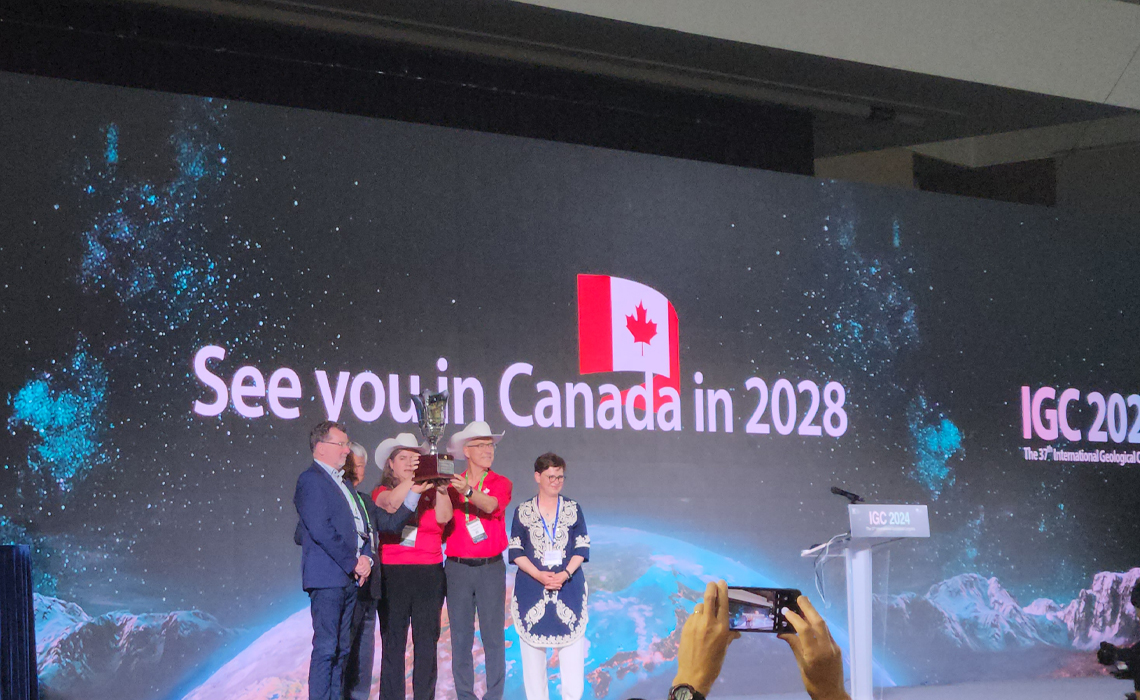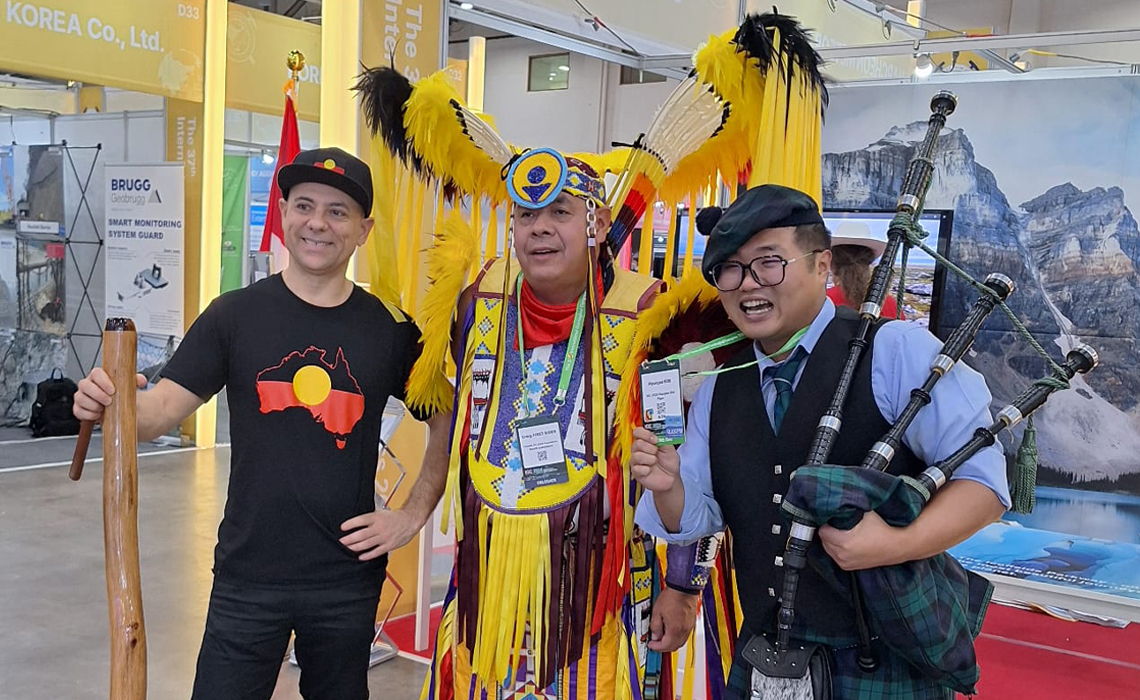MRU plays key role in bringing the 'Olympics of geology' to Calgary

In a historic achievement for Canadian geoscience, Calgary will host the 2028 International Geological Congress (IGC), often hailed as the "Olympics of geology."
Set to take place at the BMO Centre in August 2028, the event is expected to draw up to 10,000 geoscientists from across the globe, marking one of the largest gatherings in the field. With the tagline Geosciences for Humanity, the congress will delve into some of the most pressing global challenges — from climate change to space exploration and sustainable energy — all while attempting to strengthen partnerships with Indigenous communities.
Dr. Katherine Boggs, PhD, of Mount Royal University’s Department of Earth and Environmental Sciences, sees the event as more than a megaconference.
“The congress opens doors for everyone across campus,” Boggs says. “It's not just for geoscientists — students from all disciplines can get involved.
“There are students starting their programs now who could find themselves presenting their research on a global stage by 2028.”
Much like the Olympic Games, the IGC occurs every four years, moves to different cities worldwide and involves a highly competitive bidding process. For Boggs, Calgary’s successful bid was the result of relentless hard work and a complete team effort.
Along with Dr. David Eaton, PhD, from the University of Calgary, Boggs co-chaired Calgary’s successful bid committee, showcasing the city's geological heritage, energy innovation and ties with Indigenous communities.
Collaborating with Indigenous communities
The 2028 congress isn’t just a nod to Canada’s geological significance — it’s also a celebration of the enduring relationship between Indigenous peoples and the land.
In 2028, attendees will be invited to experience Indigenous culture through daily smudge ceremonies, cultural teachings at an outdoor longhouse and indoor workshops. All of the activities were organized with guidance from an Indigenous advisory committee.
Throughout the bid process, the Iniskim Centre at Mount Royal and Office of Indigenization and Decolonization played an important role, providing guidance on collaboration and representation.
“We met regularly to ensure that all aspects were culturally appropriate,” Boggs says.
MRU students and alumni make their mark
MRU students and alumni were instrumental at every level of the bid and will continue to play a role in the congress itself.
Third-year Environmental Sciences major Melvin Spear Chief and Bachelor of Science in Geology alumna Emily Head narrated the promotional video that wowed the international audience at the 2024 conference in South Korea. Blackfoot dancer Craig First Rider, an alumnus of MRU’s Social Work program, was likely the “most photographed individual at IGC 2024,” according to Boggs.

Brendan Lazar, a MRU Bachelor of Science graduate, designed the IGC2028 website and logo, while Amrine Dubois-Gafar, program manager for one of Boggs’ research initiatives, took over the website’s development.
Students like first-year Geology major Holly Bley and Jerry Demorcy played a key role in leading the social media strategy, which helped garner widespread attention during the bidding process.
“Keeping a regular posting schedule really made a difference and kept Canada’s bid at the forefront of people’s minds,” Bley says.
Murdoch McKinnon, a graduate of the Bachelor of Science in Environmental Science program and current instructor at Mount Royal, co-chairs the scientific program subcommittee for the 2028 International Geological Congress.
The subcommittee created five themes — sustainability, climate change, natural hazards, space geology and critical minerals — to guide each day of the conference. These themes encourage participants to explore new areas and collaborate across fields, reflecting geoscience's growing focus on working together to tackle global challenges.
Alberta’s geological wonderland
Located between the western Canadian sedimentary basin and the Canadian rocky mountains, Calgary is — quite literally — a natural choice for hosting a geology summit. The city is a gateway to five UNESCO World Heritage sites, each within a day’s drive.
McKinnon helped plot out the more than 50 proposed field trips and workshops that take IGC attendees deep into Canada’s geologically rich landscapes. Attendees are invited to explore Dinosaur Provincial Park, the Frank Slide Interpretive Centre, Writing-on-Stone Provincial Park, Head-Smashed-In Buffalo Jump, as well as the Turner Valley Gas Plant National Historic Site of Canada.
McKinnon highlights the unique blend of natural beauty and scientific significance that Alberta offers, noting how well-established research networks have shaped much of what we know about mountain ecosystems.
“Alberta is also home to a lot of industry, so there’s constant interaction between humans and the environment,” he says. “The conference theme, ‘geosciences for humanity,’ captures that relationship — how we benefit from geological resources but also how we’re working to restore and respect these ecosystems.
“It’s not just about offering exciting excursions for tourists; it’s about showing the cutting-edge research that’s happening on the ground and how it connects to the big picture of sustainability and ecosystem restoration.”
As a central point in North America, McKinnon notes, Calgary offers easy access to diverse landscapes — from the prairies and boreal forests to the tundra and the West Coast — making it a perfect base for exploring the continent's geological diversity. Additionally, the city’s location enables cross-border collaborations with American geoscientists, further enhancing the congress’ global reach.
“This is the first time the congress has ever been held in western Canada, and we’re one of the last major geological hubs to finally host it,” McKinnon says. “It is a great opportunity to showcase the innovation happening here — innovation that doesn’t always get the attention it deserves.”
Collaboration and creativity: the hallmarks of Team Canada’s success
Officially the 38th International Geological Congress, the 2028 event will mark 56 years since Canada last hosted the congress, in Montreal in 1972, and nearly 40 years since the event was held in North America.
For Boggs, the success of Calgary’s bid is a testament to the power of teamwork. More than 50 letters of support poured in, and countless people — from students to government officials — came together to make it happen.
“This is an unparalleled opportunity for the Canadian geoscience community,” Boggs says. “Events like this happen once in a lifetime, and we’re excited to showcase what Canada — and MRU — can bring to the global stage.”

